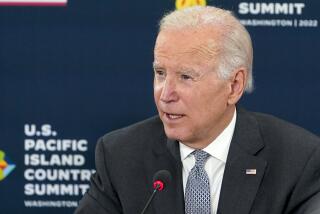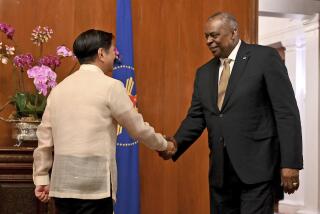Shultz Trip to Focus on Philippines, Cambodia
- Share via
WASHINGTON — Secretary of State George P. Shultz departs Tuesday for a seven-nation tour of East Asia during which U.S. officials hope to conclude an agreement on continued American use of military bases in the Philippines and to make progress toward a settlement of Cambodia’s political future.
For three months, American and Philippine officials have been meeting to review the conditions under which U.S. forces make use of Clark Air Base and the Subic Bay Naval Base in the Philippines. The Manila government is seeking a substantial increase in the military aid package, now at $180 million a year, that the United States provides in exchange for the bases.
In recent weeks, several U.S. officials have expressed optimism that a deal on the bases might be struck by the time Shultz visits Manila and meets with President Corazon Aquino on July 11 to 13.
‘Tone Is Changing’
“It looks now like there will be an agreement when Shultz goes out there,” one senior U.S. official said last week. “There are no guarantees, but the negotiations have become much more serious.” Another U.S. official said that “the tone is changing” in the talks and that he hopes the two sides can come to terms by the time Shultz reaches Manila.
Any agreement on the U.S. bases would be a short-term one, officials said. It probably would settle questions of U.S. compensation to the Philippines until the current agreement on the bases runs out in 1991. However, it would leave unsettled the question of whether the United States can continue to use the strategically located facilities after that time.
During his 15-day trip to Asia, Shultz will stop first in Bangkok, Thailand, to attend the 21st annual meeting of foreign ministers of the Assn. of Southeast Asian Nations (ASEAN). He then will travel to Malaysia, Indonesia, the Philippines, Hong Kong, China, South Korea, Japan and the Marshall Islands. It will probably be the last trip to Asia in his six-year tenure as secretary of state.
Officials of the ASEAN countries--Thailand, Malaysia, Singapore, Indonesia, the Philippines and Brunei--are expected to seek U.S. help in reaching a political settlement of Cambodia’s future at a time when Vietnam is withdrawing troops from that country.
News agency reports Saturday from Bangkok said that the ASEAN meeting, which opens Monday, will consider a plan that calls for a cease-fire in the Cambodian conflict, a three-phase Vietnamese troop withdrawal, a two-phase disarmament of Cambodian combatants, establishment of a provisional government in Phnom Penh and elections supervised by an international peacekeeping force to be stationed in Cambodia for five years.
The plan also calls for an end to support for the factions in the conflict and for repatriation of nearly 120,000 Cambodian refugees now in Thai camps, the reports said.
The crucial question is how much power, if any, will be given to the Khmer Rouge--the Cambodian Communist movement, led by Pol Pot, which killed more than 1 million people when it ruled the country between 1975 and 1978. The Khmer Rouge regime was finally ousted when Vietnamese troops invaded Cambodia.
U.S. officials said they are strongly opposed to any new Khmer Rouge regime in Cambodia. However, they and Southeast Asian officials now appear to be leaving the door open for a settlement under which some Khmer Rouge officials other than Pol Pot and his associates might be part of a new coalition government headed by Prince Norodom Sihanouk.
Cannot Be Ignored
“One cannot disregard a faction as large as the Khmer Rouge,” Tommy T .B. Koh, Singapore’s ambassador to the United States, said last month. “It still is the largest faction in the Cambodian resistance” to the Vietnamese-backed leadership.
In Beijing, U.S. officials said, Shultz intends to talk to Chinese leaders about their continuing efforts to sell missiles to several countries in the Middle East and Persian Gulf.
“I think he (Shultz) will make it very plain . . . that this is something which we feel very deeply about,” said a senior Reagan Administration official last week. “We are concerned (about) the effect that this may have on peace and stability.”
This Administration official, who briefed reporters on Shultz’s Asian trip, was asked what the secretary of state would tell Philippine officials concerning the negotiations over the U.S. bases.
He said that Shultz’s message will be: “Let’s get it over with.”
More to Read
Sign up for Essential California
The most important California stories and recommendations in your inbox every morning.
You may occasionally receive promotional content from the Los Angeles Times.













